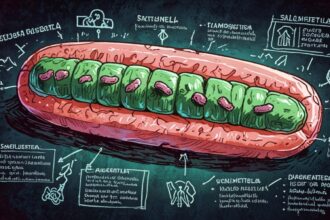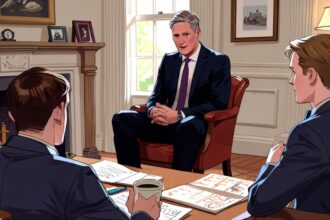The resignation of Sir Jeffrey Donaldson as leader of the Democratic Unionist Party following charges of historical sex offences marks a tumultuous moment for Northern Ireland politics, prompting questions about the future of power-sharing and the direction of the DUP under interim leader Gavin Robinson.
Sir Jeffrey Donaldson, the leader of the Democratic Unionist Party (DUP), has resigned abruptly after being charged with historical sex offences. His resignation is a significant event in both British and Irish politics, leaving questions about the future of power-sharing in Northern Ireland. Donaldson, who is Northern Ireland’s longest-serving MP, had a political career spanning almost four decades, starting with the Ulster Unionist Party before joining the DUP in 2004. Recognised for his contributions to politics with a knighthood in 2016, Donaldson’s leadership focused on addressing post-Brexit trading arrangements and the Irish Sea border issue. With his departure, Gavin Robinson, MP for East Belfast, has been appointed as interim leader of the DUP.
The announcement of Donaldson’s resignation follows his tenure marked by a clear stance on several political issues, including his contributions towards restoring power-sharing in Stormont and opposing threats during negotiations with the Government. Born in Kilkeel, Donaldson entered politics after the IRA murdered his cousin, reflecting a personal stake in his political journey. His transition from the Ulster Unionist Party to the DUP leadership in 2021 highlighted his evolving political stance, particularly his resistance to the Good Friday Agreement’s terms.
Donaldson’s resignation has triggered a contest for the DUP leadership, with significant implications for the party’s future direction and its approach to power-sharing within the devolved institutions of Northern Ireland. Sinn Féin leader Mary Lou McDonald sees an opportunity for Irish unity amidst this political upheaval, while the DUP faces challenges in maintaining its parliamentary stronghold and ensuring the stability of Stormont.
This transition period in DUP leadership, marked by Gavin Robinson’s interim tenure, places the party at a crossroads, with potential impacts on its stance towards devolved governance and its relationship with other political entities in Stormont. The choice of Donaldson’s successor will be crucial in determining the DUP’s political trajectory and its role in the future of Northern Ireland’s political landscape.













